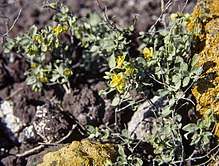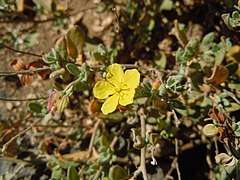Helianthemum canariense
Helianthemum canariense is a species of flowering plant in the family Cistaceae, native to Western Sahara, Morocco and the Canary Islands.[1]
| Helianthemum canariense | |
|---|---|
 | |
| In habitat at Punta Roja, Tenerife | |
| Scientific classification | |
| Kingdom: | Plantae |
| Clade: | Tracheophytes |
| Clade: | Angiosperms |
| Clade: | Eudicots |
| Clade: | Rosids |
| Order: | Malvales |
| Family: | Cistaceae |
| Genus: | Helianthemum |
| Species: | H. canariense |
| Binomial name | |
| Helianthemum canariense (Jacq.) Pers.[1] | |
| Synonyms[1] | |
| |
Description
Helianthemum canariense is a short, densely branched shrub up to 25 cm (10 in) tall. Its oval leaves are greyish in appearance due to a dense covering of short hairs, and are 5–10 mm (0.2–0.4 in) long. The pale yellow flowers are about 1–2 cm (0.4–0.8 in) across.[2]
 Flower
Flower
Taxonomy
The species was first described by Nikolaus von Jacquin in 1781 or 1782, as Cistus canariensis, and transferred to Helianthemum in 1806 by Christiaan Persoon.[3]
Distribution and habitat
Helianthemum canariense is native to the Canary Islands, Western Sahara and Morocco.[1] In the Canary Islands, it is found on all islands in dry areas, up to altitudes of 600 m (2,000 ft).[2]
References
- "Helianthemum canariense (Jacq.) Pers.", Plants of the World Online, Royal Botanic Gardens, Kew, retrieved 2018-01-28
- Bramwell, David & Bramwell, Zoë (2001), Wild Flowers of the Canary Islands (2nd ed.), Madrid: Editorial Rueda, pp. 225–226, ISBN 84-7207-129-4
- "Plant Name Details for Helianthemum canariense", The International Plant Names Index, retrieved 2018-01-29